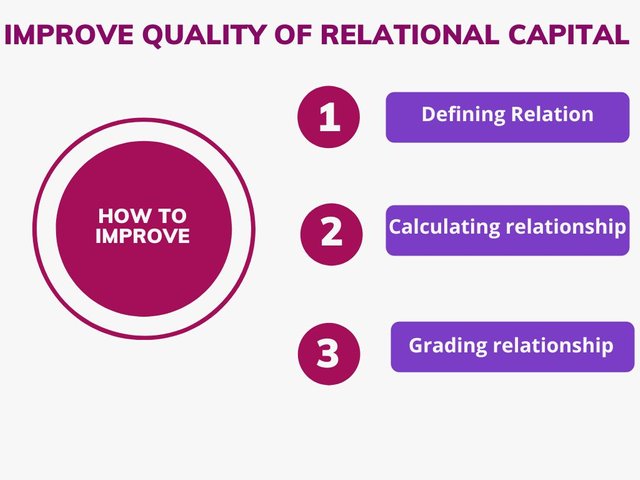Three Steps to Improve Quality of Relational Capital

https://catchonpakistan.com/2022/06/16/improve-quality-of-relational-capital/
What is relationship Capital:
The network of people and companies that represent your leadership team, attorneys, board, clients, intermediaries, partners, suppliers, and employees constitute your relationship capital. These relationships underpin other types of capital, for example, your firm’s reputation, brand, and intellectual property.
The three types of intellectual capital which make up the intangible value of a business are its people (human capital), everything that is left when these people go home (structural capital), and the value inherent in its relationships (relational capital).
Relationship capital is defined as – The sum of all of the relationships of all of the people within any firm. These can be relationships with contacts such as board members, clients, intermediaries, partners, suppliers, and with your alumni, ex-employees, and people in your space with high influence.
Prime Day is in 25 days Calculating relationship Capital
Broad areas need to be taken into consideration while calculating, including:
Seniority of the contact
Type of relationship
Strength of relationship
Depth of the relationship at an organizational level
Recency of the relationship
Activity levels and types
Why Relationship Capital management is important – Reasons
Client Relationships are Key to Business Sustainability especially in service sector.
A reducing relationship strength helps you to identify threats early, helping you take actions to prevent a key client from leaving
A strong relationship means there’s less motivation for clients to move to your competitors
Weak depth in a client relationship could indicate a “key individual risk” where just one partner leaving may result in a client following them out of the door
Business development and marketing costs decrease as winning business from a new client is 5 times more expensive than winning more business from an existing client
Relationship strength and profitability correlate as existing clients are more likely to trust you are charging a fair price and are less likely to “haggle” or argue over the invoice
Clients with strong relationships pay their bills faster, reducing lockup and improving cash flow
Better matching of people to projects based on understanding who has strong existing relationships, increasing (and speeding up) the chances of clients instructing you
Strong relationships improve advocacy, which generates additional revenue via client promotion and referrals
Happier clients lead to happier employees, improving staff retention
Further you can read my following article.